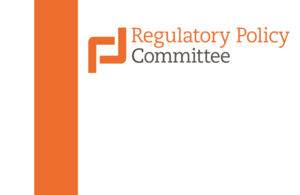Regulatory Policy Committee: verified costs and benefits of regulatory provisions
Regulatory Policy Committee publishes list of verified measures, including those expected to count towards the government’s £10 billion deregulation target.

The Regulatory Policy Committee today welcomed the opportunity to offer its first update on the measures it has so far verified, and which are expected to count towards the government’s £10 billion deregulation target.
As of 7 March, the RPC had scrutinised and verified the net costs of 109 measures, and has today published a list of these on its website. The RPC also has a remit to review whether alternatives to regulation could be used to deliver the same outcome. Of the measures reviewed, 78 are expected to count towards the government’s £10 billion deregulation target.
Changes directly benefitting business include a deregulatory measure aimed at speeding up cheque payments, saving £100 million per year, and new regulation resulting in charging of plastic carrier bags expected to save £203 million per year through additional revenue from consumers and reducing costs associated with carrier bags. However, the RPC notes that businesses are expected to pass the additional revenue to charities, and therefore in practice a large part of the validated benefits will be felt by charities rather than businesses themselves.
Two measures impose moderately large costs on business – the banning of sales or advertising of harmful substances, costing £48 million each year from requiring standardised tobacco packaging, and £26 million each year from banning the sale of psychoactive substances. The government legislated for standardised tobacco packaging in the previous parliament, although the regulations will not come into force until May 2016.
The measure that will impose the greatest cost on business is the National Living Wage, with a net cost to business of £821 million in the first year. As announced last week, Government has decided to make this a non-qualifying regulatory provision through a specific exclusion from the business impact target.
RPC chairman, Michael Gibbons CBE, said:
Having been appointed as the government’s Independent Verification Body last year, I am pleased to be publishing our first update on the measures that we have verified to date, and setting out transparently where we are starting to see regulatory costs and benefits to business.
This independent validation will allow all to judge whether the government has met its commitment to cut costs to business from red tape by £10 billion over this parliament. The RPC is pleased to play an important part in ensuring business and civil society organisations have confidence in the costs and benefits submitted by Departments for new regulatory and deregulatory proposals”.
For the full report please click here.